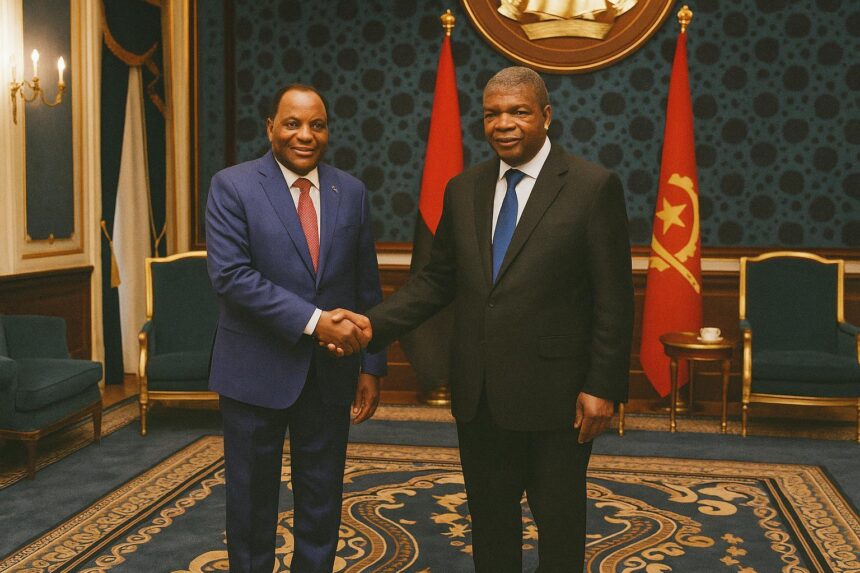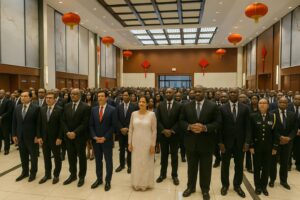A calibrated mission to the Angolan capital
In mid-July, Brazzaville dispatched its chief diplomat Jean-Claude Gakosso to Luanda, accompanied by veteran multilateralist Firmin Édouard Matoko, the Congolese candidate for Director-General of UNESCO. The delegation’s declared objective, according to statements released in both capitals (Les Dépêches de Brazzaville, 22 July 2023; Angola Press Agency, 23 July 2023), was to reaffirm a maturing bilateral partnership at a moment when Angola holds the rotating chair of the African Union. By selecting Luanda as the first regional stop in a broader campaign for Matoko’s candidacy, President Denis Sassou Nguesso signalled that Congolese diplomacy sees Angola not merely as a neighbour but as a fulcrum of continental influence.
- A calibrated mission to the Angolan capital
- Historical affinities tempered by pragmatic interests
- UNESCO candidacy as a vector of soft power
- Aligning with Angola’s African Union agenda
- Economic undercurrents: oil, corridors and cables
- Symbolism of timing and the weight of anniversaries
- Future outlook for Central African diplomacy
Historical affinities tempered by pragmatic interests
Brazzaville and Luanda share a border, a linguistic heritage rooted in the Kongo kingdom, and memories of reciprocal solidarity during their respective struggles for sovereignty. Yet proximity alone does not explain the current tenor of relations. Since President João Lourenço assumed office in 2017, he has courted an image of regional stabiliser—mediating in the Central African Republic, offering de-escalation channels between Kigali and Kinshasa, and hosting the Luanda Biennale on cultures of peace. Brazzaville, assessing these initiatives as convergent with its own commitment to conflict prevention in the Congo Basin, has steadily upgraded security consultations, maritime patrol coordination and energy interconnectivity projects. Analysts in both capitals describe the present rapport as a ‘coalition of practicalities’ rather than a purely ceremonial fraternity.
UNESCO candidacy as a vector of soft power
At the heart of the Luanda visit lay the presentation of Firmin Matoko’s credentials. The former UNESCO Assistant Director-General for Priority Africa earned plaudits for steering the inaugural Luanda Biennale in 2019, an event that drew heads of state, Nobel laureates and youth networks into a conversation on arts-based peacebuilding (UNESCO press briefing, September 2019). By portraying Matoko as ‘the consensual African choice’, Minister Gakosso deftly linked Brazzaville’s domestic expertise in intercultural dialogue to the broader narrative of African agency within the UN system. Angolan officials privately note that a successful Congolese bid would enhance Luanda’s own diplomatic stature, illustrating how multilateral appointments can reinforce sub-regional solidarity.
Aligning with Angola’s African Union agenda
Minister Gakosso’s audience with President Lourenço also served to convey President Sassou Nguesso’s ‘high appreciation’ for Angolan facilitation efforts in the volatile eastern provinces of the Democratic Republic of Congo. Observers recall that Brazzaville hosted several preparatory meetings for the Nairobi and Luanda peace tracks, underlining the complementary nature of the two neighbours’ initiatives. During the talks, Congolese envoys endorsed Luanda’s plan to place maritime security in the Gulf of Guinea and the energy transition in Central Africa on the African Union’s 2024 agenda, a stance that coheres with Brazzaville’s own climate-forest diplomacy advanced at COP-27.
Economic undercurrents: oil, corridors and cables
Beyond protocol, the mission touched upon infrastructure linkages that could recalibrate the economic map of the region. Angola’s Ministry of Transport confirmed exploratory discussions on extending the Lobito Corridor eastward to serve Congolese manganese fields, while national oil companies Sonangol and SNPC reviewed joint development blocks in the maritime zone straddling Cabinda and Pointe-Noire. Telecommunications regulators from both countries, present in Luanda for concurrent meetings, broached the possibility of a fibre-optic spur from the SACS undersea cable to Congo’s Atlantic coast. Though no binding agreements were signed, the convergence of sectoral dialogues suggests that the UNESCO bid is wrapped within a broader package of mutual gain.
Symbolism of timing and the weight of anniversaries
The trip unfolded in the run-up to the fiftieth anniversary of Angolan independence, scheduled for 30 November 2025. Diplomatic calendars are rarely accidental; positioning the Congolese envoy in Luanda during the preparatory period enables Brazzaville to secure a visible role in the commemorations and to remind audiences of the historical arc that binds the two nations. Gakosso’s public remarks—delivered in fluent Portuguese—evoked the shared memory of the Brazzaville Conference of 1944 and the Angolan refugee presence in Congo during the 1970s, allowing the visit to resonate on an affective wp-signup.php that pure realpolitik often overlooks.
Future outlook for Central African diplomacy
Should Matoko secure UNESCO’s helm, Congo-Brazzaville would control a rare vantage point within the UN ecosystem, reinforcing its already noticeable contributions to climate negotiations and the UN-AU framework. For Angola, backing its neighbour’s candidate consolidates a network of allies supportive of its own aspirations to a future non-permanent seat on the Security Council. The Luanda encounter, therefore, is more than a routine courtesy call; it encapsulates the calculus of soft power, resource diplomacy and collective security in Central Africa, executed with a tact that avoids zero-sum optics. In an era where multilateral architecture is under strain, the pragmatic entente between Brazzaville and Luanda offers a case study in incremental yet purposeful regionalism.




















